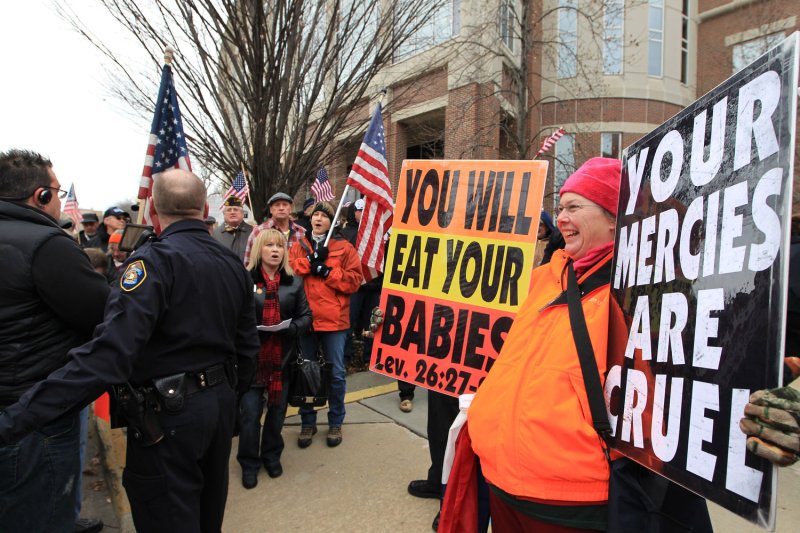1 of 3 | Paulette Phelps of the Westboro Baptist Church of Topeka, Kansas,(R) taunts those with opposite viewpoint during a demonstration in St. Charles, Missouri on January 6, 2011. The church which preaches against all form of sin, is known for showing up at military funerals to drive home their anti-gay point. St. Charles County has passed a law that the Westboro Baptist Church demonstrators must be atleast 300 feet from any military funeral or burial. The law is now being challanged in Federal court by the ACLU. UPI/Bill Greenblatt |
License Photo
WASHINGTON, March 2 (UPI) -- The U.S. Supreme Court ruled 8-1 Wednesday an anti-gay Kansas pastor and his congregation cannot be sued for picketing military funerals.
Writing for the majority, Chief Justice John Roberts said the protests were protected by the free speech guarantee of the First Amendment.
Since 2005, the Rev. Fred Phelps Sr. and members of his Westboro Baptist Church of Topeka, Kan., have shown up at the funerals of service members to protest what they consider the military's toleration of homosexuality, and the toleration of homosexuality in the United States. They warn of the anger of a just God and say dead soldiers are the evidence of that anger.
In 2006, Phelps and others picketed the Maryland funeral of Matthew Snyder, a 20-year-old U.S. Marine killed in the line of duty in Iraq. The protesters carried signs saying, among other things, "Thank God for dead soldiers," "God hates fags," "Fag troops," "Pope in hell" and "You're going to hell." They also posted an "epic" on their Web site titled, "The Burden of Marine Lance Cpl. Matthew A. Snyder."
Snyder's shocked family sued and won a jury verdict. A federal judge upheld the verdict and $5 million in damages for emotional distress, but a federal appeals court reversed, saying the protesters were using "rhetorical hyperbole" absolutely protected by the First Amendment.
The U.S. Supreme Court affirmed the appellate ruling. Roberts cited high court precedence, saying "speech on public issues occupies the 'highest rung of the hierarchy of First Amendment values' and is entitled to special protection."
The "content" of Westboro's signs plainly relates to public, rather than private, matters," the opinion said. "The placards highlighted issues of public import -- the political and moral conduct of the United States and its citizens, the fate of the nation, homosexuality in the military and scandals involving the Catholic clergy -- and Westboro conveyed its views on those issues in a manner designed to reach as broad a public audience as possible. Even if a few of the signs were viewed as containing messages related to a particular individual, that would not change the fact that the dominant theme of Westboro's demonstration spoke to broader public issues."
Justice Samuel Alito was the lone dissenter.
"Our profound national commitment to free and open debate is not a license for the vicious verbal assault that occurred in this case," he said. The fallen soldier's father, "Albert Snyder is not a public figure. He is simply a parent whose son, Marine Lance Cpl. Matthew Snyder, was killed in Iraq. Mr. Snyder wanted what is surely the right of any parent who experiences such an incalculable loss: to bury his son in peace. But respondents, members of the Westboro Baptist Church, deprived him of that elementary right. ...
"As a result, Albert Snyder suffered severe and lasting emotional injury. The (Supreme) Court now holds that the First Amendment protected respondents' right to brutalize Mr. Snyder. I cannot agree."















